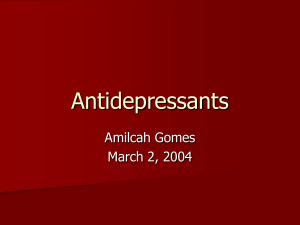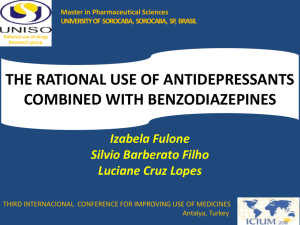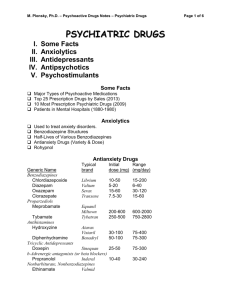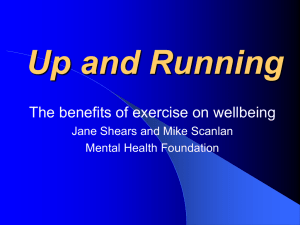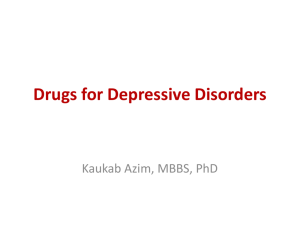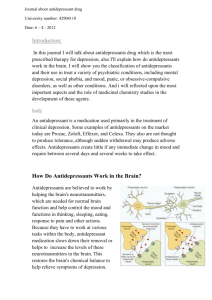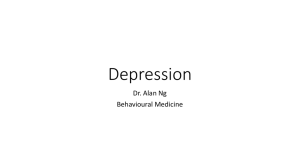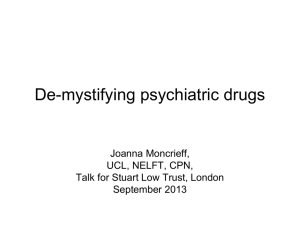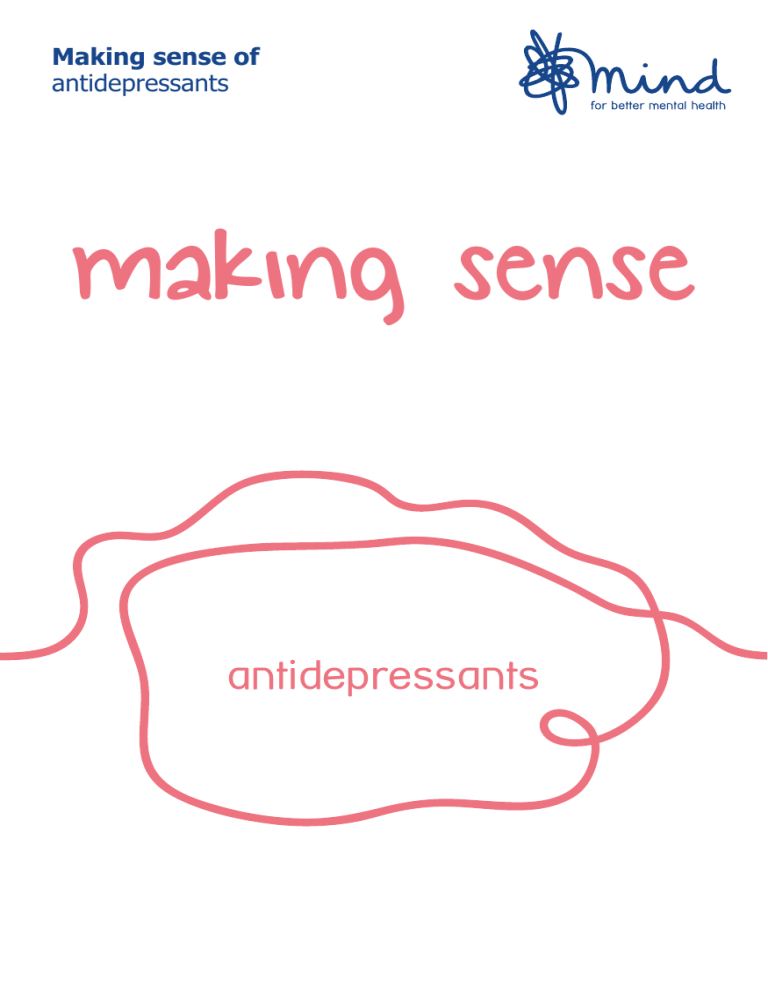
Making sense of antidepressants making sense antidepressants Making sense of antidepressants This booklet is for anyone who wants to know more about antidepressant medication. It explains what antidepressants are, how they work, possible side effects and information about withdrawal. Contents What are antidepressants? 4 Could antidepressants help me? 7 What do I need to know before taking antidepressants? 8 What side effects can antidepressants cause? 11 What withdrawal problems can antidepressants cause? 17 Can I take them while pregnant or breastfeeding? 20 Alternatives to antidepressants 24 How can I compare different antidepressants? 25 3 Making sense of antidepressants What are antidepressants? Antidepressants are psychiatric drugs which are available on prescription and are licensed to treat depression. Some are also licensed to treat other conditions, such as: ••anxiety ••phobias ••bulimia (an eating disorder) ••some physical conditions. I took medication for six months. It helped lift the fog and gave me the energy I needed to tackle the root cause of my depression. There is no shame in taking medication to treat an illness. How do they work? Antidepressants work by boosting or prolonging the activity of particular brain chemicals, such as noradrenaline and serotonin, which are thought to be involved with regulating mood. Noradrenaline and serotonin are neurotransmitters. This means that they pass messages between nerve cells in your brain, and between nerves and other target organs in the rest of your body. By causing a change to your brain chemistry, antidepressants may lift your mood. However, antidepressants don't work for everyone, and there is no scientific evidence that depression is caused by a chemical imbalance which is corrected by antidepressants. What different types of antidepressant are there? There are several different types of antidepressants, which were developed at different times. They all tend to act on the same brain chemicals and cause similar effects, but the different types have different chemical structures, and may have different side effects. 4 What are antidepressants? The different types are: ••selective serotonin reuptake inhibitors (SSRIs) ••serotonin and noradrenaline reuptake inhibitors (SNRIs) ••tricyclics and tricyclic-related drugs ••monoamine oxidase inhibitors (MAOIs) ••other antidepressants. (For a list of all antidepressants grouped by type see Mind's page on 'Comparing antidepressants', or for detailed information on an individual antidepressant see our online 'Antidepressants A–Z'). Selective serotonin reuptake inhibitors (SSRIs) About SSRIs: ••They were first developed in the late 1980s, so they have been in use for about 30 years. ••They work by blocking the reuptake of serotonin into the nerve cell that released it, which prolongs its action in the brain. ••The side effects that SSRIs can cause are generally easier to cope with than those of other types of antidepressants. ••They're the most commonly prescribed type of antidepressant in the UK. Serotonin and noradrenaline reuptake inhibitors (SNRIs) About SNRIs: ••The first of these was developed in the early 1990s, so they're one of the newer types of antidepressant. ••They're very similar in action to SSRIs, but they act on noradrenaline as well as serotonin. ••They have a more selective action than tricyclics, which means they're better at targeting the brain chemicals which affect your mood, without causing unwanted side effects. ••They're sometimes preferred for treating more severe depression and anxiety. 5 Making sense of antidepressants Tricyclic and tricyclic-related drugs About tricyclics: ••They're the oldest type of antidepressant, first developed in the 1950s. ••They work by prolonging the action of noradrenaline and serotonin in the brain. ••They're called ‘tricyclic’ because of their chemical structure, which has three rings. ••They tend to cause more unpleasant side effects compared with other types of antidepressants. About tricyclic-related drugs: ••They act in a very similar way to tricyclics, but they have a slightly different chemical structure. ••They tend to cause more unpleasant side effects compared with other types of antidepressants, but they're less likely to cause antimuscarinic effects than tricyclics. Monoamine oxidase inhibitors (MAOIs) About MAOIs: ••They work by making it harder for an enzyme (monoamine oxidase) that breaks down noradrenaline and serotonin to do its job, causing these chemicals to stay active in the body for longer. ••They can have dangerous interactions with some kinds of food, so when taking MAOIs, you need to follow a careful diet. ••Because of these interactions, you're not likely to be prescribed an MAOI unless you've tried all other types of antidepressant and none of them have worked for you. ••They should only be prescribed by specialists. Other antidepressants There are also several other antidepressants available which don't fit into any of the categories above. For more information about these antidepressants, see Mind's online 'Antidepressants A–Z'. 6 Could antidepressants help me? Could antidepressants help me? For depression If you experience depression, it can mean that you feel very down a lot of the time and: ••no longer enjoy the things you usually do ••find it hard to talk to people about how you feel ••find it hard to look after yourself and carry out day-to-day tasks. An antidepressant might help to lift your mood so you feel more able to do all those things. You might then be able to benefit more from other, more long-term help (see 'Alternatives to antidepressants' on p.24 for examples of other treatments). The first time I was prescribed [antidepressants], I only took them for a few weeks. During another episode of depression, I was put on [an SSRI] and found it, along with some counselling, helped. Antidepressants are generally not recommended for mild to moderate depression. They are more likely to be effective if your depression is severe. Your doctor will help you decide whether antidepressants are an appropriate treatment for you, depending on your personal circumstances and how severe your depression is. For anxiety If you have some form of anxiety or phobia, an antidepressant could help you to feel calmer, more able to deal with other problems, and more able to benefit from alternative treatments. 7 Making sense of antidepressants Once I started taking [an antidepressant], I started to feel better. I was then able to start to see a psychologist and work on the deeper rooted issues. How soon will they start working? Most antidepressants take 1–2 weeks to start working, but you might feel the benefit sooner than this. If you don’t feel any benefit (or if you feel worse) after taking an antidepressant for 2–4 weeks, discuss this with your doctor – different types of drug all work slightly differently, and it’s possible that a different antidepressant would suit you better. I was a total mess before I started my antidepressants. After a struggle through the first two weeks, I began to see the light at the end of what had been a very long tunnel. What do I need to know before taking antidepressants? Before you decide to take any medication, you should make sure you have all the facts you need to feel confident about your decision. (See Mind's page 'What do I need to know before I take medication?'). Should I ever avoid antidepressants? All drugs carry levels of risk in different circumstances, and can affect different people in different ways. However, there are some general circumstances in which you should be particularly cautious about taking antidepressants. 8 What do I need to know before taking antidepressants? These include: ••if you are pregnant or breastfeeding (see 'Can I take them while pregnant or breastfeeding?' on p.20) ••if you are taking other drugs ••if you are under 18 ••if you plan to drink alcohol. For specific risks associated with individual antidepressants you can look up the name of the drug in Mind's online 'Antidepressants A–Z'. What if I'm taking other drugs? You should tell your doctor about any other drugs you are taking before taking an antidepressant, including any illegal drugs and anything you have bought over the counter. This is important because of: ••Possible drug interactions – antidepressants interact with a number of other types of drugs, and some interactions can be dangerous. ••More severe side effects – if you are prescribed several interacting psychiatric drugs together, it can make the side effects of each individual drug worse. You can find out details of known interactions for individual antidepressants in Mind's online 'Antidepressants A–Z'. What if I'm under 18? If you are under 18, you should be aware that: ••Antidepressants are not tested clinically on young people under 18 years old, so there's less information available about the possible risks. ••Antidepressants are not licensed to treat depression in children under 16. ••If your doctor does prescribe you an antidepressant while you are under 18, they should be very cautious about the dose and take your physical size into account. 9 Making sense of antidepressants The National Institute for Health and Care Excellence (NICE) produces guidelines on depression in children and young people, which gives recommendations about which antidepressants can be given to children and who can prescribe them. What if I want to drink alcohol? You should be very careful about drinking alcohol while you are taking antidepressants, and check with your doctor or pharmacist whether it's safe with the drug you've been prescribed. Drug interactions Alcohol does interact with most antidepressants. This can: ••make you feel more drowsy than you would from taking the drug on its own ••affect your ability to perform skilled tasks, such as driving ••(for older people) make you more prone to falls and confusion. Alcohol can cause low mood Remember: alcohol itself is a depressant. Drinking alcoholic drinks might be one of the things that’s causing you to feel depressed in the first place, without you realising it. See Mind's information on 'Food and mood' for more information on how the things you eat and drink can affect the way you feel. 10 What side effects can antidepressants cause? What side effects can antidepressants cause? Every antidepressant has the potential to cause particular side effects, and these can vary from drug to drug (for details of the possible side effects of a particular antidepressant, look it up in Mind's online 'Antidepressants A–Z'). Remember that while some side effects are quite common, many of them are rare, and not everyone experiences them. It's up to you to decide whether or not the antidepressant has more benefits for you than side effects. (See Mind's resource 'Coping with side effects' for more information). It took me a long time to take an SSRI, mainly as I was terrified of the side effects listed, but my doctor finally convinced me that my depression was much worse [than the side effects]. 11 Making sense of antidepressants There are some side effects that are common to all antidepressants of a particular type. Type of antidepressant SSRIs and SNRIs Tricyclic and tricyclic-related antidepressants MAOIs Side effects that all drugs of this type can cause (most common first) • decreased alertness • sexual problems ••diabetes ••SIADH (Syndrome of Inappropriate Antidiuretic Hormone Secretion) ••serotonin syndrome ••suicidal feelings ••neuroleptic malignant syndrome ••hypomania or mania ••antimuscarinic effects ••tooth decay ••decreased alertness ••suicidal feelings ••serotonin syndrome ••SIADH (Syndrome of Inappropriate Antidiuretic Hormone Secretion) ••diabetes ••neuroleptic malignant syndrome ••hypomania or mania. ••decreased alertness ••SIADH (Syndrome of Inappropriate Antidiuretic Hormone Secretion) ••serotonin syndrome ••diabetes ••suicidal feelings ••neuroleptic malignant syndrome For guidance on what to do if you experience a side effect, see Mind's resource 'Coping with side effects'. 12 What side effects can antidepressants cause? Antimuscarinic effects Antimuscarinic effects (sometimes called anticholinergic effects) is the medical term for a group of side effects which can occur with many different types of drugs – especially tricyclic antidepressants. They include: • blurred vision • confusion and agitation ••constipation, which may become life-threatening if not treated ••difficulty urinating ••drowsiness ••dry mouth, which can cause tooth decay in the long term ••hallucinations ••hot or dry skin, and decreased sweating ••increased pressure in the eye ••low blood pressure (taking hot baths increases this risk) ••rapid heartbeat and disturbed heart rhythm ••trembling. These side effects can happen because, as well as affecting brain chemicals related to mood, the drug can also affect brain chemicals which control the different functions in your body. Decreased alertness Antidepressants can make you feel less alert or able to concentrate. This can affect: ••driving ••other skilled tasks. Diabetes Long-term use of antidepressants over several years is associated with an increased risk of diabetes, especially in people who are: ••over the age of 30 ••taking SSRIs or tricyclics. 13 Making sense of antidepressants Hypomania or mania Antidepressants may trigger hypomania or mania in some people. This may stop if you stop taking the antidepressant, but sometimes it is interpreted as a sign of bipolar disorder. In this case, you may be given a new diagnosis and different medication. Neuroleptic malignant syndrome This is a rare, but serious, condition. It is usually associated with antipsychotic drugs (sometimes known as neuroleptics), but can occasionally occur with antidepressants. The symptoms include: ••changes in your level of consciousness ••fast heart rate ••high temperature ••pale skin ••stiffness ••sweating ••unstable blood pressure ••urinary incontinence. Serotonin syndrome This is a serious condition which, although rare, can be fatal. It can occur with any antidepressant, but is more likely with an SSRI – especially if you take it alongside other antidepressants, including MAOIs, and lithium (a mood stabiliser). The symptoms are (most common first): ••headaches ••nausea (feeling sick) ••diarrhoea ••high temperature, shivering and sweating ••high blood pressure and a fast heart rate ••tremors, muscle twitching and over-responsive reflexes 14 What side effects can antidepressants cause? ••convulsions (fits) ••agitation, confusion and hallucinations ••coma (loss of consciousness). These symptoms may come on very suddenly. Sexual problems Certain sexual problems are a potential negative side effect of all SSRI and SNRI antidepressants. These include: In women: ••delayed orgasm or inability to reach orgasm ••spontaneous orgasm. In men: ••reduced sexual desire ••failed erection, delayed ejaculation and lack of orgasm ••priapism (prolonged erection) – this requires urgent medical attention, so if you experience this side effect, you should go to A&E or get a same-day appointment with your GP. Sometimes these side effects persist after you've come off the drug, and might continue indefinitely. If you experience this, you might want to report it on a Yellow Card (yellowcard.mhra.gov.uk). SIADH (Syndrome of Inappropriate Antidiuretic Hormone Secretion) SIADH is a rare side effect of some antidepressants – mainly tricyclics, SSRIs and SNRIs. The antidiuretic hormone (vasopressin) is one of the hormones that control the production of urine. SIADH makes your body secrete too much antidiuretic hormone, which causes your body to hold on to water and makes you become low in sodium (this condition is called hyponatraemia). 15 Making sense of antidepressants This can lead to: ••confusion ••convulsions (fits) ••hallucinations ••coma (loss of consciousness), potentially leading to death ••memory problems, difficulty concentrating, drowsiness and falls (mainly in older people). Suicidal feelings There is a possibility that taking an antidepressant could make you feel suicidal – even if you didn’t experience suicidal feelings before. This side effect is mainly associated with SSRI antidepressants, although all antidepressants carry this risk. How could an antidepressant cause suicidal feelings? There are two possible explanations: ••When you’re severely depressed, your energy and motivation levels are very low, but taking an antidepressant can change this. A common theory for explaining suicide in the early stages of treatment is that the drug might give you the energy to act on suicidal urges before your depression has really started to lift. ••A number of scientists believe that some drugs might directly cause suicidal thoughts and urges. The discussion usually focuses on SSRIs in particular, but research suggests that all antidepressants carry similar risks. If you find you are experiencing suicidal feelings while taking antidepressants you should discuss it with doctor as soon as possible. For more information about suicidal feelings, including information about what kind of support is available, see Mind's pages on 'How to cope suicidal feelings'. If you feel in immediate crisis you can contact the Samaritans on 116 123 (freephone), or go to your local hospital's A&E department. 16 What withdrawal problems can antidepressants cause? Tooth decay Any drugs which cause a dry mouth can also cause tooth decay if you take them for a long time. This side effect is most commonly associated with tricyclic antidepressants. What withdrawal problems can antidepressants cause? Antidepressants are not addictive – you don't get cravings for them or need to keep increasing the dose to get the same effect. However, all psychiatric drugs change your brain and body chemistry, and if you have been taking them for a while, your body will have adjusted to them. This means that you may experience withdrawal symptoms when you stop taking them – especially if you've been taking them for a long time. For this reason, it's always advisable to reduce the dose slowly instead of just stopping taking them. (See Mind's pages on 'Coming off psychiatric drugs' for more information). I was worried about not being able to come off them... My doctor helped me to come off them in a controlled way, and apart from one dip just after I stopped taking them, I've been pretty OK since. This table below shows the possible withdrawal effects associated with different types of antidepressants. You won't necessarily get any of these symptoms, but many people do experience some of them. 17 Making sense of antidepressants SSRIs and SNRIs Symptoms that will feel new to you: ••dizziness or vertigo ••electric shock sensations in head ••flu-like symptoms ••problems with movement ••sensory disturbance (such as smelling something that isn't there) ••stomach cramps ••strange dreams ••tinnitus (ringing in the ears) Symptoms that could feel like your original problem: ••anxiety ••crying spells ••depersonalisation (feeling detached from your surroundings) ••depression ••disturbed sleep ••fatigue (feeling very weary) ••mania ••mood swings ••poor concentration and memory ••suicidal thoughts 18 MAOIs ••agitation ••difficulty thinking ••disturbed sleep ••extreme sleepiness ••hallucinations ••irritability ••psychotic experiences, such as paranoid delusions ••problems with movement ••strange dreams ••unsteadiness Tricyclics and tricyclic-related drugs ••anxiety ••fast or irregular heartbeat ••flu-like symptoms, such as: ◦ aching muscles ◦ chills ◦ goosebumps ◦ headaches ◦ nausea (feeling sick) ◦ sweating ••insomnia (inability to sleep) ••low blood pressure ••problems with movement ••restlessness ••spontaneous orgasm ••strange dreams What withdrawal problems can antidepressants cause? For information on the specific withdrawal effects associated with a particular drug, you can look up the name of the drug in Mind's online 'Antidepressants A–Z'. [When] I thought I should try to manage without the antidepressant, I did not manage to come off them, which I was incredibly harsh on myself about… I was then on [an antidepressant] until I had been well for a number of years, and then, with the help of my GP, I reduced and stopped the medication. Can switching antidepressants help with withdrawal? If you've been taking a drug with a short half-life, and are having problems with withdrawal symptoms, it might be possible for you to switch to a related drug with a longer half-life, which should be easier to come off. For example, the SSRI with the longest half-life is fluoxetine (Prozac). If you are taking an SSRI with a short half-life, it may be helpful to talk to your doctor about switching to fluoxetine and withdrawing slowly from that. To compare the half-lives of all antidepressants, see 'How can I compare different antidepressants?' on p.25. Staying safe Withdrawing from antidepressants can be hard to do. For more information on how to come off your medication safely, see Mind's pages on 'Coming off psychiatric drugs'. 19 Making sense of antidepressants Can I take them while pregnant or breastfeeding? Expecting a baby is an emotional time for anyone, but it can be particularly tough if you experience a mental health problem like depression or anxiety. You might already be taking antidepressants when you become pregnant, or you might be offered antidepressants to treat a problem you develop during your pregnancy, or after giving birth, such as postnatal depression (PND). If you are taking antidepressants, and you are planning a pregnancy or have become pregnant, you should discuss this with your GP. They will be able to give you more information about your options, and may refer you for specialist care. I developed severe postnatal depression and OCD just three days after the birth of my daughter. I was non-functioning, I couldn't even leave the house and was suicidal... [My antidepressant] really helped, and gave me the crutch I needed to function again. I really feel like it saved my life. What are the benefits? While you're pregnant, and after giving birth, it's important that you are well so that can look after yourself and your baby properly. If not taking antidepressants would mean you would become unwell or be unable to cope, you may decide that the best thing for you and your baby is to continue taking them. Ultimately, you will need to balance the possible risks to your baby against any potential harm in not taking your medication, and come to your own decision about what's best for you, based on your own experience. 20 Can I take them while pregnant or breastfeeding? It's understandable to feel conflicted about this, and you might find it helpful to seek extra support during this time. When I got pregnant I was terrified of not being able to look after a child in the mental state I was in. So I tried [antidepressants]. I couldn't function anywhere near as well till I had them. What are the risks? The risks include: ••Possible birth defects. There is evidence that taking SSRIs early in pregnancy slightly increases the risk of your baby developing heart defects, spina bifida, cleft palate and hare lip. ••Increased risk of miscarriage and premature birth. ••Withdrawal symptoms in the newborn baby. Taking any antidepressant in late pregnancy (including tricyclics, SSRIs and SNRIs) carries this risk. Withdrawal symptoms in a newborn include: ◦ With tricyclics: fast heartbeat, irritability, muscle spasms, restlessness, sleeplessness, fever and fits. ◦ With SSRIs and SNRIs: jitteriness, poor muscle tone, not being able to cry loudly, difficulty breathing, low blood sugar (which can cause fits), and high blood pressure in the lungs. ••When breastfeeding, the drug could be passed to your baby through your breast milk. It is possible that the levels could become high enough for your baby to experience side effects from the medication. ••Unknown risks. Drugs are not clinically tested in pregnant women, and newer drugs carry a higher unknown risk than drugs that have been around longer, simply because scientists have had less time to gather evidence about them. All risks are likely to be higher during the first three months and last few weeks of your pregnancy, when your baby is more vulnerable. 21 Making sense of antidepressants What if I need to take medication? If you feel you need to take antidepressants while pregnant or breastfeeding, you should discuss this with your doctor. They can advise you about which drugs carry fewer risks than others. For example: ••Tricyclic antidepressants are likely to be less risky than SSRIs in the early months of pregnancy. ••If you wish to breastfeed, you should avoid taking doxepin (Sinepin). Your GP (or psychiatrist if you have one) should also be in touch with the midwife or antenatal team managing your pregnancy, who may arrange extra scans to make sure everything is developing normally. Breastfeeding and antidepressants Deciding whether to breastfeed your child is a very personal decision. If you're taking antidepressants, you should be aware that: ••Breastfeeding carries the risk that the drug may be passed on to the baby, and cause side effects. ••Breastfeeding has certain benefits for your baby, such as providing better nutrition and immunity against illnesses. It’s up to you decide what’s right for you and your baby, and whether the benefits of breastfeeding outweigh the risk of side effects. For more information, you can discuss this with your doctor, midwife or antenatal team. If you have experienced a mental health problem in the past, you might also have a higher risk of experiencing postnatal depression (PND) after you give birth. If you're worried that you might experience PND, it's worth discussing it with your doctor and midwife in advance, to make sure you have appropriate support in place. 22 Can I take them while pregnant or breastfeeding? What are the alternatives to medication? There are a number of alternatives to antidepressants available. If you don't want to take medication while pregnant or breastfeeding, your doctor should make every effort to help you access alternative treatments. With the right support, you might be able to manage your mental health without medication. (See Mind's information on 'Coming off psychiatric drugs' for guidance on how to come off your medication safely). What other support is available? Coming to a decision you feel comfortable with about what's right for you and your baby can be difficult. You might find it helpful to explore these options for extra support: ••Family and friends – if you're able, it can be helpful to talk through your feelings with someone you trust, such as your partner, or a close friend. ••Midwife appointments – you can talk to your midwife about how you're feeling throughout your pregnancy. They can also help make sure you receive plenty of support from your health visitor after you give birth. ••Online peer support – websites such as Netmums (netmums.com) and Mumsnet (mumsnet.com) offer a supportive online network for all parents and parents-to-be. It can be helpful to talk to other people who've had similar experiences themselves, who can reassure you that you're not alone. Elefriends (elefriends.org.uk) is another online community where you can share your feelings about your mental health in a supportive environment. (For guidance on how to manage being online when you're feeling vulnerable, see Mind's information 'How to stay safe online'). ••Specialist websites – websites such as NCT (nct.org.uk) and the Breastfeeding Network (breastfeedingnetwork.org.uk) can also provide information and support. 23 Making sense of antidepressants You might also find it helpful to read Mind's pages on 'Parenting with a mental health problem', which include information on helping yourself, looking after children and other kinds of support available. Alternatives to antidepressants If you don't want to take antidepressants, there are lots of alternative treatments you can try. In fact, unless your depression is very severe, the National Institute for Health and Care Excellence (NICE) guidelines recommend that antidepressants should not be your main treatment. NICE suggests that before prescribing you medication, your doctor should recommend: ••exercise ••a talking treatment, such as cognitive behavioural therapy (CBT). (See Mind's pages on 'Talking treatments' for more information about the different kinds that are available). What other therapies are available? You might also find it helpful to investigate an alternative therapy, such as: ••complementary therapies ••mindfulness ••arts therapies ••ecotherapy. Antidepressants didn’t work for me – I took [an antidepressant] for many months without recovering from depression. [For me], mindfulness helps to change the way you think and how you deal with negative thoughts. 24 How can I compare different antidepressants? What else can I try? Other things you could try include: ••Thinking about what you eat and drink – food and mood are related, so you might be able to lift your mood by making changes in your diet (see Mind's pages on 'Food and mood' for more information). ••St John's Wort – this is a herbal medicine that is sometimes used to treat symptoms of depression and anxiety, and is available without a prescription (see Mind's pages on 'St John's Wort' for more information). ••Waiting – sometimes depression can go away, so your doctor might offer you a second appointment to see how you're feeling after a few days before discussing treatment options. How can I compare different antidepressants? This section contains comparison tables, presenting all antidepressants by: ••type of antidepressant ••length of half-life ••available form ••dietary information. Why might I want to compare antidepressants? After considering the cautions before taking any antidepressant, you might want to know more about the different antidepressants available to help you talk to your doctor about what's right for you. Possible situations might include: ••If you have problems with a particular type of antidepressant (such as tricyclics), and want to avoid them. ••If the drug's half-life is important to you – for example, if you are concerned about withdrawal effects and would prefer a drug with a long half-life. (See Mind's page on half-life for information about what this means and why it matters). 25 Making sense of antidepressants ••If you have problems with swallowing, or are unable to take tablets, and need your medication in a different form. ••If you have any dietary restrictions, such as being vegetarian, or if you are allergic or intolerant to some ingredients. ••If you are worried about the impact of particular side effects, such as whether it could affect your ability to drive. (For information about the side effects of a particular antidepressant, you can look the drug up in our antidepressants A–Z). Remember: drugs don't work the same way for everyone, and it's important to find a medication that works for you. See Mind's page on 'Receiving the right medication' for more information. 26 How can I compare different antidepressants? Comparing antidepressants by type Type of antidepressant SSRIs SNRIs Tricyclics Tricyclic-related drugs MAOIs others Drug names ••citalopram ••escitalopram ••fluoxetine ••fluvoxamine ••paroxetine ••sertraline ••duloxetine ••venlafaxine ••amitriptyline ••clomipramine ••dosulepin ••doxepin ••imipramine ••lofepramine ••nortriptyline ••trimipramine ••mianserin ••trazodone ••isocarboxazid ••phenelzine ••moclobemide ••tranylcypromine ••agomelatine ••mirtazapine ••reboxetine ••Triptafen ••vortioxetine 27 Making sense of antidepressants Comparing antidepressants by half-life (For information about what the half-life means and why it matters, see Mind's resource 'Explaining the half-life'). Half-life 1–2 hours about 2 hours Drug name agomelatine tranylcypromine 2–4 hours 4–7 hours 5–13 hours 6–39 hours 8–17 hours 9–25 hours 11–12 hours 12–24 hours 12–36 hours about 13 hours 17–22 hours about 19 hours 20–40 hours 22–36 hours about 23 hours about 24 hours about 30 hours 33–80 hours (1.5–3.3 days) about 36 hours about 36 hours about 36 hours moclobemide venlafaxine trazodone mianserin duloxetine amitriptyline phenelzine lofepramine clomipramine reboxetine fluvoxamine imipramine mirtazapine sertraline trimipramine paroxetine escitalopram doxepin 28 citalopram isocarboxazid nortriptyline How can I compare different antidepressants? about 50 hours (just over 2 days) about 66 hours 96–144 hours (4–6 days) n/a (see half-life information for amitriptyline and perphenazine) dosulepin vortioxetine fluoxetine Triptafen 29 Making sense of antidepressants Comparing antidepressants by form available Form tablets Antidepressants agomelatine amitriptyline citalopram clomipramine dosulepin escitalopram fluvoxamine imipramine isocarboxazid available in this form lofepramine tranylcypromine mianserin trazodone mirtazapine trimipramine moclobemide Triptafen nortriptyline venlafaxine paroxetine vortioxetine phenelzine reboxetine sertraline capsules clomipramine doxepin dosulepin duloxetine fluoxetine trazodone trimipramine venlafaxine liquid amitriptyline fluoxetine imipramine lofepramine mirtazapine paroxetine trazodone oral drops citalopram escitalopram vortioxetine dispersible tablets* mirtazapine fluoxetine *dispersible tablets will disintegrate quickly in the mouth or can be mixed with water, orange juice or apple juice. 30 How can I compare different antidepressants? Comparing antipsychotics by dietary considerations Dietary consideration Contains lactose Contains gelatin Requires food restrictions Drugs this applies to agomelatine citalopram doxepin imipramine isocarboxazid lofepramine mianserin nortriptyline trazodone trimipramine some formulations of venlafaxine duloxetine fluoxetine imipramine isocarboxazid tranylcypromine trazodone some formulations of venlafaxine isocarboxazid moclobemide phenelzine tranylcypromine All other antidepressants currently available do not contain lactose or gelatin, and do not require any specific dietary restrictions, although caution when drinking alcohol is a recommended for all antidepressants (see 'What do I need to know before taking antidepressants?' on p.8). 31 Further information Support Mind Mind offers a range of mental health information on: • diagnoses • treatments • practical help for wellbeing • mental health legislation • where to get help Providing information costs money. We really value donations, which enable us to get our information to more people who need it. To read or print Mind’s information booklets for free, visit mind.org.uk or contact Mind Infoline on 0300 123 3393 or at info@mind.org.uk Just £5 could help another 15 people in need receive essential practical information. If you would like to support our work with a donation, please contact us on: tel: 0300 999 1946 email: supportercare@mind.org.uk web: mind.org.uk/donate To buy copies of Mind’s information booklets, visit mind.org.uk/shop or phone 0844 448 4448 or email publications@mind.org.uk This information was written by Dr Katherine Darton Published by Mind 2016 © 2016 To be revised 2018 No reproduction without permission References available on request Mind is a registered charity No. 219830 Mind (National Association for Mental Health) 15-19 Broadway London E15 4BQ tel: 020 8519 2122 fax: 020 8522 1725 web: mind.org.uk Mind e're Mind, the mental health charity for W England and Wales. We believe no one should have to face a mental health problem alone. We're here for you. Today. Now. We're on your doorstep, on the end of a phone or online. Whether you're stressed, depressed or in crisis. We'll listen, give you advice, support and fight your corner. And we'll push for a better deal and respect for everyone experiencing a mental health problem. Mind Infoline: 0300 123 3393 / Text: 86463 info@mind.org.uk mind.org.uk 33
